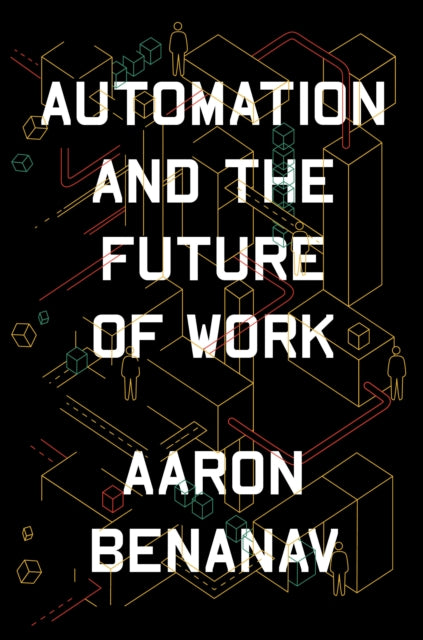Aaron Benanav
Automation and the Future of Work
Automation and the Future of Work
YOU SAVE £3.03
- Condition: Brand new
- UK Delivery times: Usually arrives within 2 - 3 working days
- UK Shipping: Fee starts at £2.39. Subject to product weight & dimension
Bulk ordering. Want 15 or more copies? Get a personalised quote and bigger discounts. Learn more about bulk orders.
Couldn't load pickup availability
- More about Automation and the Future of Work
The rise of robots is discussed as the end of work as we know it, but does it explain the jobs crisis? Automation and the Future of Work by Aaron Benanav uncovers economic trends that will shape our working lives, and proposes a counter-proposal for a universal basic income.
Format: Hardback
Length: 160 pages
Publication date: 03 November 2020
Publisher: Verso Books
Silicon Valley titans, politicians, techno-futurists, and social critics have united in arguing that we are living on the cusp of an era of rapid technological automation, heralding the end of work as we know it. However, does the much-discussed rise of the robots truly explain the jobs crisis that awaits us on the other side of the coronavirus? In Automation and the Future of Work, Aaron Benanav uncovers the structural economic trends that will shape our working lives far into the future. He asks, what social movements are required to propel us into post-scarcity, if technological innovation alone cannot deliver it? In response to calls for a universal basic income that would maintain a growing army of redundant workers, he offers a counter-proposal.
The rise of automation and technological advancements has been a topic of much debate and speculation in recent years. While some argue that these changes will lead to job loss and economic inequality, others suggest that they will create new opportunities and improve productivity. One of the most prominent voices on this issue is economist and author Aaron Benanav, who has written extensively about the future of work and the impact of automation.
In his book Automation and the Future of Work, Benanav argues that we are living on the cusp of an era of rapid technological automation, which will have a profound impact on the way we work and live. He suggests that while automation may eliminate some jobs, it will also create new ones and transform existing industries. For example, he predicts that automation will lead to the growth of industries such as healthcare and logistics, which require specialized skills and knowledge.
However, Benanav also acknowledges that the impact of automation on the workforce will not be uniform. He argues that certain sectors, such as manufacturing and transportation, will be particularly affected, while others, such as education and healthcare, will experience growth. He suggests that policymakers and businesses need to take steps to address the potential impact of automation on workers, including providing training and support for those who may be displaced by technological change.
One of the key challenges facing policymakers and businesses in the age of automation is the need to create a sustainable and equitable economic system. Benanav argues that a universal basic income, which provides a guaranteed income to all citizens, could be one way to address this challenge. He suggests that a universal basic income could help to reduce inequality and provide a safety net for those who are displaced by automation or other economic changes.
However, some critics argue that a universal basic income is not the solution to the jobs crisis facing the workforce. They argue that it would create a disincentive to work and could lead to increased dependency on government assistance. Instead, they suggest that policymakers and businesses should focus on creating new jobs and investing in education and training to ensure that workers have the skills they need to thrive in the age of automation.
Another issue that Benanav addresses in his book is the role of social movements in driving technological innovation and social change. He argues that social movements, such as the labor movement and the environmental movement, have played a critical role in shaping the technological advancements that have led to the rise of automation. He suggests that these movements need to continue to play a role in driving social and economic change in the future, in order to ensure that the benefits of automation are shared fairly and equitably.
In conclusion, Automation and the Future of Work is a thought-provoking and important book that provides a comprehensive analysis of the impact of automation on the workforce and the economy. While automation may eliminate some jobs, it will also create new ones and transform existing industries. Policymakers and businesses need to take steps.
Weight: 274g
Dimension: 149 x 217 x 20 (mm)
ISBN-13: 9781839761294
This item can be found in:
UK and International shipping information
UK and International shipping information
UK Delivery and returns information:
- Delivery within 2 - 3 days when ordering in the UK.
- Shipping fee for UK customers from £2.39. Fully tracked shipping service available.
- Returns policy: Return within 30 days of receipt for full refund.
International deliveries:
Shulph Ink now ships to Australia, Belgium, Canada, France, Germany, Ireland, Italy, India, Luxembourg Saudi Arabia, Singapore, Spain, Netherlands, New Zealand, United Arab Emirates, United States of America.
- Delivery times: within 5 - 10 days for international orders.
- Shipping fee: charges vary for overseas orders. Only tracked services are available for most international orders. Some countries have untracked shipping options.
- Customs charges: If ordering to addresses outside the United Kingdom, you may or may not incur additional customs and duties fees during local delivery.


